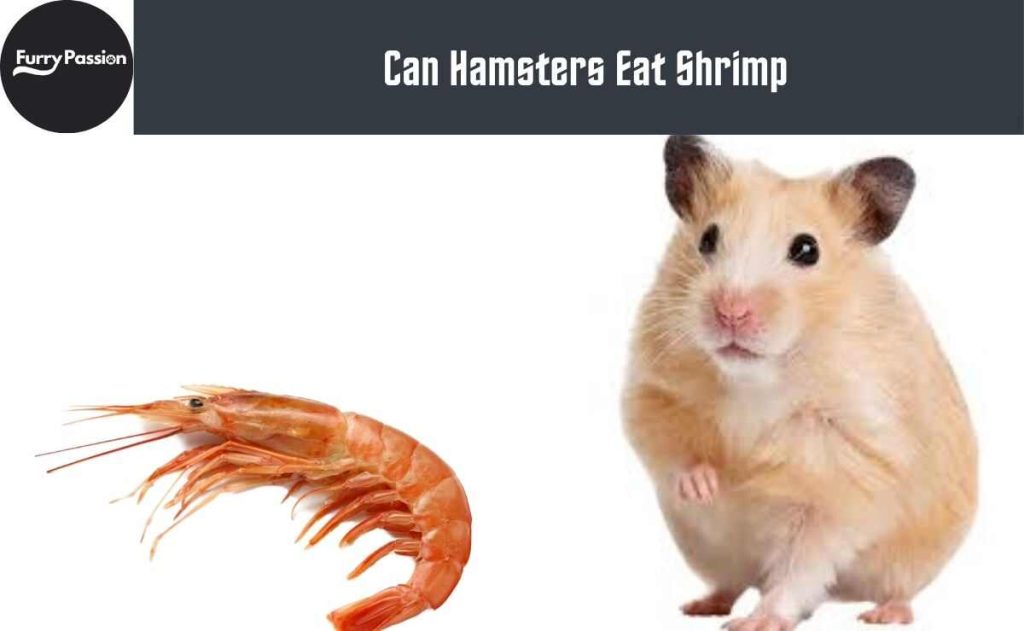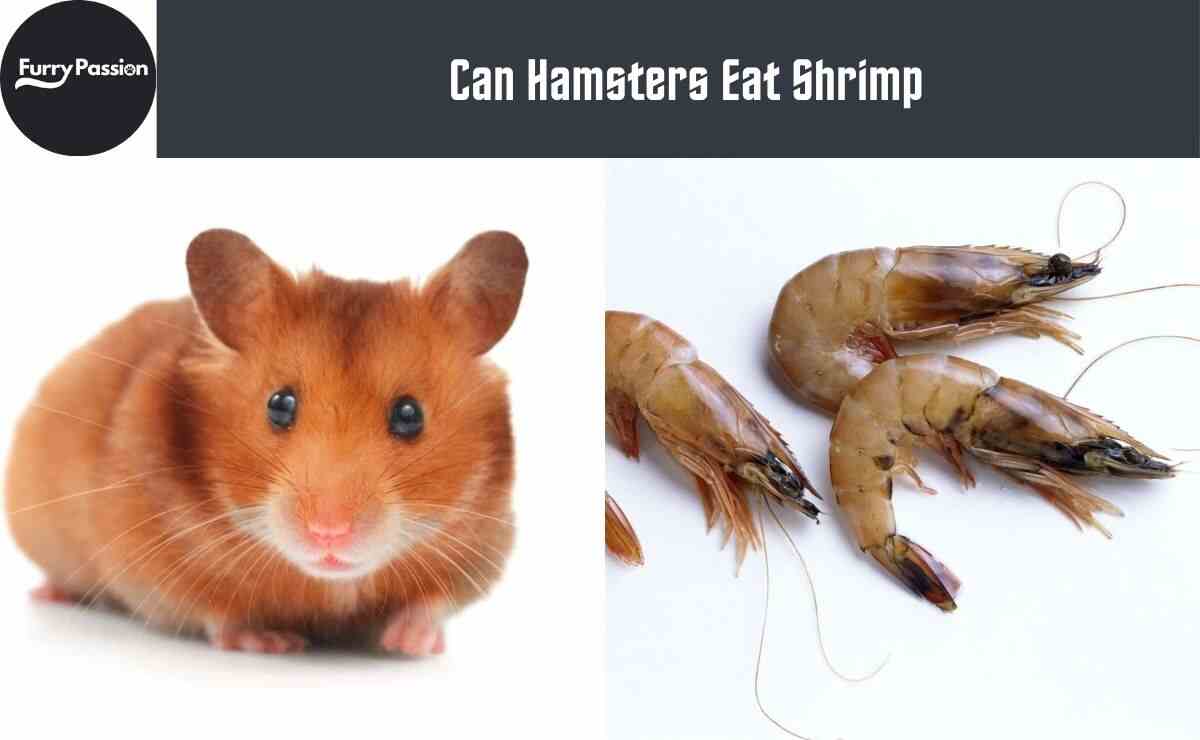Hamsters are omnivores. In the wild, they eat plant-based foods and insects, and they get the proper nutrition from these foods. So in captivity, it is important to provide a nutritious diet and it’s your responsibility to ensure a blanched diet for them at home.
Since hamsters can eat meat and fish in small portions, many owners want to know can hamsters eat shrimp? Certainly, yes, they can. Shrimp can be a part of a hamster’s diet as an occasional treat, not a major part. And you should feed them in moderation.
Can Hamsters Eat Shrimp?

Formulated pallets are a more popular choice for a hamster’s balanced diet. However, many owners want to provide fresh fruits and treats to give a slight variety in their food.
Shrimp is favored seafood and it contains high protein content. While it may seem like a good source of protein for your hamster, it is recommended to feed shrimp in moderation.
Shrimp can be a fulfilling and healthy treat for them, but feeding the recommended amount is crucial. If you feed too much, their digestive system may get upset.
Hamsters have a delicate digestive system, and seafood, including shrimp, can be too rich and fatty.
When considering whether to feed shrimp to your hamster, it’s important to choose the right type: saltwater or freshwater. While shrimp can be found in both saltwater and freshwater environments, around 80% of species reside in the ocean.
However, saltwater shrimp naturally contain higher levels of sodium, which may not be suitable for our pet hamsters. If you’re planning to treat your hamster to some shrimp, opting for freshwater shrimp is the healthier choice.
These shrimp varieties typically have lower sodium levels, making them a safer option for your furry friend’s diet. Therefore, when selecting shrimp for your hamster, prioritize freshwater options to ensure their well-being and health.
Can Hamster Eat Dried Shrimp?
Dried shrimp is a popular ingredient in some human dishes and can also be used as a treat for other pets, such as fish or reptiles. However, when it comes to hamsters, it is generally not recommended to feed them dried shrimp.
Hamsters have very specific nutritional requirements, and their digestive systems are not adapted to handle certain types of food. Dried shrimp, although it may seem like a small and harmless treat, can actually be detrimental to a hamster’s health. It is high in sodium and can potentially cause digestive issues such as diarrhea or dehydration in hamsters.
Dried shrimp may contain preservatives or other additives that could be harmful to your hamster. It is always important to check the ingredients and ensure that any food you offer to your hamster is safe and suitable for their dietary needs.
Instead of dried shrimp, there are plenty of other healthy and safe options for treats that you can offer to your hamster. You better stick to hamster-safe fruits and vegetables, such as carrots, peas, or small pieces of apple or banana. These can be given in moderation as a special treat, along with their regular diet of hamster food.
How Much Shrimp Can A Hamster Eat?
You should only feed only a tiny amount at first. Only give extra treats when you know how your hamster reacts to it. A little bit will go a long way so don’t overdo it on the first try.
When feeding your hamster new foods, you should always start with a tiny amount to ensure that they like it or not. Then keep an eye that they don’t have an allergic reaction. So if you want to try feeding your hamster shrimp then we would recommend giving a very small portion size, about the size of a teaspoon.
Another good way to work out what is the right amount of shrimp to feed your hamster is to give them a portion they can comfortably hold within their hands.
Health Benefits of Feeding Shrimp to Hamsters
Shrimp can offer several benefits to your hamster’s diet due to its nutritional content:
1. Protein: Shrimp is an excellent source of protein, which is essential for hamsters’ growth and development. It helps build strong muscles and bones, providing them with the necessary energy for their activities.
Protein plays a crucial role in building new cells and a tissue, ensuring your hamster receives an adequate amount each day.
2. Omega-3 Fatty Acids: Shrimp contains omega-3 fatty acids, which can benefit a hamster’s immune system. These fatty acids help to reduce inflammation and improve brain function, contributing to overall better health and vitality.
3. Vitamins and Minerals: Shrimp contains essential vitamins such as vitamins A, B12, B3, B2, D, and E, along with important minerals like iron and iodine. These nutrients are vital for maintaining your hamster’s overall health and ensuring the proper functioning of various physical processes.
Potential Risks For Feeding Shrimps To Hamsters
1. Sodium Content: Shrimps, in particular, can present several risks when fed to hamsters. It may contain high levels of sodium, which can be harmful to hamsters as they have specific dietary needs that differ from humans. Excess sodium intake can lead to dehydration, electrolyte imbalances, and other health complications in hamsters.
2. Additives: Shrimps contain additives or preservatives that can be harmful to your hamster. Some chemical substances used in the processing or packaging of the fish can be toxic to small animals like hamsters. Ensure that the shrimp you provide are safe and free from any potentially harmful substances.
3. Allergies: Another risk associated with feeding shrimps to hamsters is the potential for food allergies or sensitivities. Just like humans, hamsters can have allergies or sensitivities to certain foods. Shrimps are known allergens for some animals, and your hamster may have an adverse reaction if they are allergic or sensitive to shrimp proteins.
4. Choking Hazard: The size and texture of shrimps may pose a choking hazard to hamsters. Hamsters have small mouths and digestive systems, and large, tough pieces of shrimp can cause obstructions or discomfort. It is crucial to cut shrimps into small, manageable pieces and monitor your hamster carefully while they eat to prevent any choking incidents.
Before introducing any new food item into your hamster’s diet, consult with a veterinarian or an expert in small pet nutrition. A balanced, commercially formulated hamster diet is typically the best option to meet their nutritional requirements and minimize potential risks.
How To Feed Shrimp To Your Hamster?
Feeding shrimp to your hamster may seem like a peculiar topic, but it is important to ensure that you are providing your furry friend with a balanced and nutritious diet.
When introducing shrimp into your hamster’s diet, there are a few key points to consider.
First and foremost, you should always feed the thoroughly cooked shrimp. Raw shrimp can contain harmful bacteria that can cause illness in your pet. It is best to boil or steam the shrimp until it is fully cooked, and then allow it to cool before serving.
Before offering shrimp to your hamster, remove the shell and any visible fat. Shrimp can be a nutritious addition to your hamster’s diet, but the fat content can be too high and may cause digestive issues if consumed in excess.
Your hamster will receive a more balanced and appropriate portion if you remove the shell and visible fat.
Feed shrimp in moderation. While it can be a healthy protein source, it should not replace the staple diet of pellets, seeds, and fresh fruits and vegetables. Limit shrimp to small, bite-sized pieces and offer it as an occasional treat rather than a regular part of their diet.
Final Words
Feeding shrimp to your hamster can be a healthy addition to their diet if done properly. Ensure that the shrimp is thoroughly cooked, remove the shell, and cut them into bite-size pieces. Also, offer it in moderation as a treat.
It is best to stick to a balanced diet for your hamster, consisting of high-quality hamster pellets, fresh vegetables, and occasional fruit treats.
